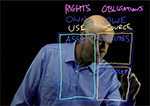Managers of all sorts, including arts managers, frequently have to decide about complexity. When we select technology tools, rent/build/buy buildings, make policy, build teams, or develop work processes, we’re calibrating how complex those things need to be against how much time, attention, and money our audiences and organizations actually have to navigate them. If a […]
Imagining the Present
The more I learn about cognitive science, the more I realize that our work in purposeful collective action – such as Arts Management – is built on faulty premises. We think, talk, and act in arts organizations as if we’re dominantly rational beings, making sense of the world and the work through conscious and explicit […]
Beauty and the Balance Sheet
The balance sheet may be a “beast of boredom” for many in the world of the nonprofit arts. But I propose that it’s one of the most essential and evocative lenses on our work. The balance sheet (aka, the Statement of Financial Position) sets the scene that shapes our capacity and constraint. And it describes a foundational difference between for-profit and nonprofit endeavor.
How We Move and Act in Time
This will be far off in the strange-o-sphere for many, but I’ve been working to describe lived human experience in a way that’s useful to practicing, learning, and teaching Arts Management. I’ll explore why this might be useful in a future post. But for now, here are the building blocks. I’d be grateful for specific […]
Which Style of Arts Manager Are You?
The new episode in the ArtsManaged video series explores the PAEI Framework by Ichak Adizes, which defines four styles of management, or “concern structures,” that might be dominant in you or in members of your team. The styles – Producing, Administrating, Entrepreneuring, and Integrating – each contribute essential impulses and actions to a thriving enterprise. […]
Naming the Useful Delusion
I’m slowly coming around to realize that the bulk of our management thinking, training, and practice is built on a useful delusion – that moving through time is like moving through physical space. This may sound philosophical or existential, but it’s inescapable, and also rather central to Arts Management as “the practice of aggregating and […]
Understanding Backward, Living Forward
Anyone who teaches, trains, or develops managers in the arts – or anyone who strives to improve themselves in the work of Arts Management – faces a trick and a trap.
Three Lenses on Marketing the Arts
The latest edition in the #ArtsManaged video series explores marketing in the arts, and the useful framework of “search,” “experience,” and “credence” goods. Understanding the nature of the opportunity you offer your potential audience, and how they might evaluate and decide upon that opportunity, is a core bit of business to attracting and retaining a […]
An emotion is a bet your body makes
Emotion is a core element of expressive action — both in the conception and creation of new work, and in all of the collective human effort that brings that work into the world. We often pretend that emotions are appropriate and essential to the artistic work and experience, while the business side of that work […]
Art and Accounting, Best Friends Forever!
I’m in Lugano, Switzerland, for the Global Cultural Districts Network convening (it is odd, unnerving, and glorious to be traveling again). And I just had to take the opportunity of this location to talk about art and accounting! Why? Because about 40 miles south of here, and about five and a quarter centuries ago, art […]











